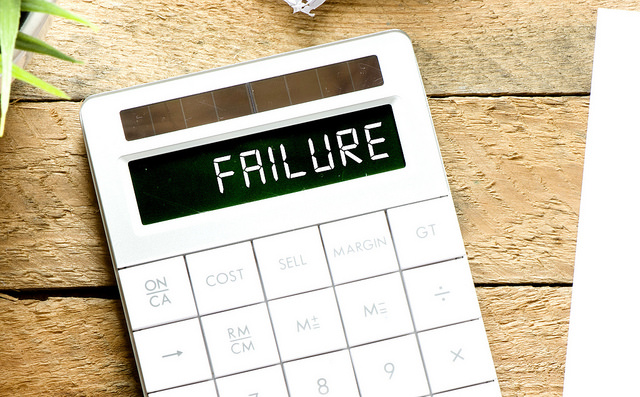
Image Credit: Mike Cohen
I’d like to be able to tell you that because of the importance of public speaking, every speech that you give will be a big success. The reality is that this is not the case. In fact, some speeches that you end up giving might even be classified as being a failure. What’s a speaker to do when this tragic event happens? It turns out that giving a speech that turns out to be a failure may be one of the most important learning experiences that you will ever have.
What Is A Speech Failure?
Ouch! I think that we all know what a speech failure feels like. There are a lot of different things that can lead to a speech failure. One of the most common ones is when we find that we are going to be giving a speech after someone who is really good gives their speech. We listen to their speech, we are impressed, and then we go up there and we blow it. It can be all too easy for us to start to blame them – “if you had not been so good, I would not have been so bad”. However, the reality is that anytime one of our speeches does not go as well as we had hoped that it would, the roots of our failure start long before we take the stage to give our speech.
If you wanted to give a good speech, how would you go about doing it? It’s all about the preparation. We need to organize our speech into three distinct parts. The opening, the body with either two or three main subtopics, and then a closing. Just to make sure that things go well we should memorize our opening and closing lines. However, when we screw up a speech we generally don’t do one or more of these things. Perhaps we don’t memorize our opening – we may still be changing it on the day of the speech! During your speech you may decide that your topic is to broad for your audience, your subtopics are not related to each other, and any transitions that you are using are not doing a good job of bridging your ideas.
Just to make things worse you may not be maintaining eye contact with your audience as your speech starts to go south. There are a number of things like this that can throw you off of your game when you are giving a speech. One of the most common ones is when you are listening to what you are saying and you realize that you have just repeated yourself. This can happen when you brain starts to get in a battle with your mouth. It doesn’t help if you know someone in the audience and you can see from the expression on their face that this speech is not going the way that you had intended it to.
How Can We Learn From A Speech Failure?
Let’s face facts: we never want to fail when we give a speech. We’ve gone through a great deal of effort to create a speech, practice a speech, and then summon the courage to get up on stage and give a speech. If we fail, then we’ve basically wasted our time and nobody wants to do that. This means that when we are giving our speech we need to make sure that we focus on the task at hand. We need to make sure that we are aware of the gestures that we are using as a part of our speech. You have to make sure that you understand how you are using your floor space. Of course, you need to make sure that you have meaningful eye contact with the people who are in your audience.
One of the main reasons that a speech can fail is because we really don’t understand what we are doing. We need to make sure that we fully understand the message that we want to deliver by giving this speech. This is not the kind of thing that we can plan out the night before we give our speech, instead we need to make sure that we work it out long before we have to give our speech. Before you give your speech, you are going to have to make sure that you know the criteria for your speech. Once you know this, you are going to have to use it to find your purpose. Having gotten all of this taken care of, you may find that you have a lot to share with your audience. That’s great news, but at the same time you are going to have to work to make sure that you’ll be able to stay within your time limit.
Creating a speech that will be a success is hard to do. We may pull together a speech and believe that we’ve done a good job, but who is really to say? Once you’ve created a speech that you want to give, you need to make sure that you still have enough time to take the next step. This is when you send a rough draft of your speech to whomever is your mentor. You want them to read it over and provide you with feedback based on what they think about your speech. Having this extra set of eyes take a look at your speech is what you need in order to get critical feedback. If you have created a speech that is going to set you up to fail, your mentor is the person who is going to be able to tell you this long before you ever take the stage. Use this step as a safety net to detect any speech failures long before they ever happen.
What All Of This Means For You
As speakers, we’d like all of our speeches to be a success. However, sadly it does not always turn out that way. In fact, sometimes when we give a speech it comes across as a big failure and we can’t share the benefits of public speaking. This can come as a surprise to us – who knew that that was going to happen? However, in order to prevent this from happening to us again, we need to understand what makes a speech a failure.
One of the things that can lead us to giving a speech that turns out to be a failure is if we speak after someone who does a great job. We hear their speech and then we start to doubt our own abilities. We all understand the three main parts that go into any speech. We also know what we need to do to prepare to give a good speech; however, we don’t always do what we should be doing and that can lead to a speech failure. As we start to give a speech, we may be engaging in self-sabotage that will cause us to lose eye contact and doubt what we are saying. Making sure that we don’t fail when we are giving a speech starts with us focusing on what we are doing. We need to use the right gestures and maintain eye contact with our audience. Every time that we agree to give a speech we need to make sure that we understand our message, understand our purpose, and make sure that we’re going to be able to stay within the time that we’ve been allocated. If time permits, once we’ve got a rough draft of our speech we’ll want to run it by our mentor to make sure that it will not turn out to be a failure.
Failure in speaking is something that will eventually happen to all of us. No, we don’t want it to happen; however, there is probably no way that we can avoid it forever. However, since we know that it can happen there are steps that we can take before giving any speech that will lower our chances of having a speech failure. If we take the time to prepare for our next speech properly and ensure that we have all of the information that we are going to need, then we have a very good chance of avoiding a speech failure and instead having a speech success.
– Dr. Jim Anderson
Blue Elephant Consulting –
Your Source For Real World Public Speaking Skills™
Question For You: If while you are giving a speech you feel as though it is going to be a failure, what steps can you take right then to save it?
![]() Click here to get automatic updates when The Accidental Communicator Blog is updated.
Click here to get automatic updates when The Accidental Communicator Blog is updated.
P.S.: Free subscriptions to The Accidental Communicator Newsletter are now available. Subscribe now: Click Here!
Note: What we talked about are advanced speaking skills. If you are just starting out I highly recommend joining Toastmasters in order to get the benefits of public speaking. Look for a Toastmasters club to join in your home town by visiting the web site www.Toastmasters.org. Toastmasters is dedicated to helping their members to understand the importance of public speaking by developing listening skills and getting presentation tips. Toastmasters is how I got started speaking and it can help you also!
What We’ll Be Talking About Next Time
Just going to the effort of creating and delivering a speech is a big challenge. However, once you start to spend some time thinking about who you’ll be talking to, this challenge can become an even bigger deal. When we realize that just about every audience that we’ll be talking to will contain people from other parts of the world, this means that we need to tailor our speech so that we can share the importance of public speaking with them and they’ll be able to understand us. Although we may be open to doing this, many of us simply don’t know how to go about making this happen. We need some suggestions on how to make our next speech one that that the entire world can appreciate.

